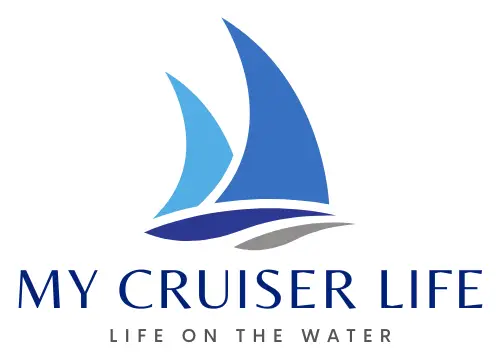If you’re a dreamer like me—and it seems that all boaters are!—then you might spend a lot of time looking at used boats. One of the things you might look at and compare is the number of hours on the engine. If so, you need to know how many hours is a lot for a boat.
When shopping for a used car, most people can immediately tell that 200,000 miles are a lot of miles. But how do boats measure their time and use?
Boat hours are one way, but there are holes in that system. For example, the year and miles might tell you a nearly complete story about how a car was used and how much life it has left, but boat hours tell a much less complete story.
Table of Contents
- Engine Hours and Boat Use
- Types of Boat Engine and Lifespans
- How to Check Boat Engine Hours
- Beyond Hours – Other Factors to Consider
- So, How Many Hours on a Boat is A Lot?
- Boat Hours FAQs
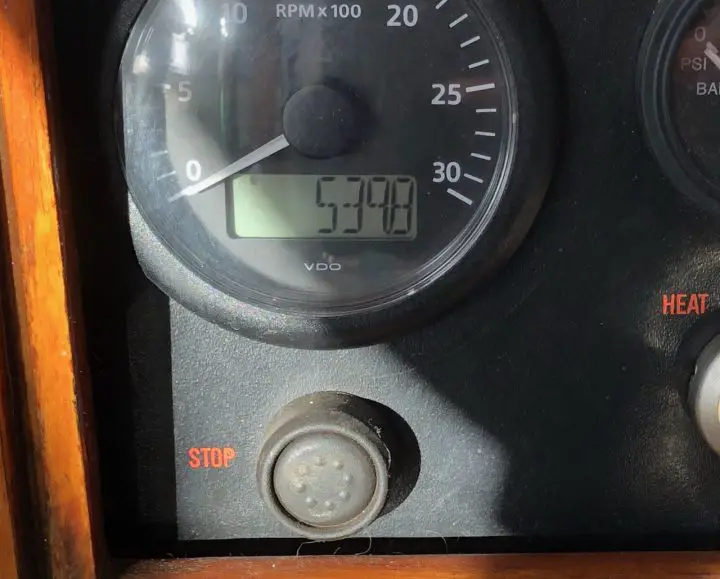
Engine Hours and Boat Use
The hours on a boat engine come right off a gauge on the instrument cluster. On some motors, it is built into the tachometer. It’s used for maintenance purposes—if you’re supposed to change the oil every 100 hours, you’ll need an hour meter to measure it for you.
But hours alone don’t tell you very much about how the boat was run during those hours. Maybe it was left idling at the dock, or maybe the previous owner used only two throttle settings—off and full speed ahead.
But there’s an even bigger problem with what is considered high hours on a boat. That is the problem of how boats are used. You see, most boats see very little use.
It’s actually sad, really. Walk around any marina, boatyard, or even home owner’s dock, and you will see boats that are not being used. Pleasure boats spend much of their time sitting at docks or on trailers, not going anywhere.
That might sound good, in theory. Less use means less wear and tear, right? And when looking at used boats, you want one in the best condition you can find!
But boats can have too much of a good thing. As a matter of fact, sitting unused and unmaintained is a very bad thing for boats. A boat used regularly and maintained regularly will provide many years of service. But a boat that sits unattended? It rots away and falls apart in record time.
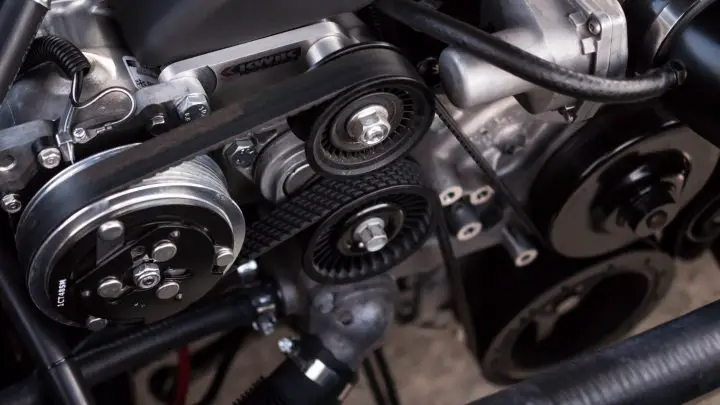
You might have heard that your car should be started and driven occasionally if you’re going to store it. Starting the motor gets the oil circulating, which lubricates the metal parts and keeps everything in tip-top shape. Driving it prevents flat spots on the tires, and in the process of driving it, you’re moving all the accessories and parts around to keep the working.
The same is true with boats, only much more so. Boat engines benefit as much as car engines do, but don’t forget the corrosive environment that boats live in. Leaving stagnant seawater in the exhaust system for months at a time? Not a great idea.
Every other system inside the boat suffers the same fate. If it’s used, it will likely keep working. If it’s left to its own devices, who knows when it will fail.
So with this in mind, you can see why you’ll need to carefully consider how many hours on a boat is a lot on a case-by-case basis. For example, if a boat is three years old, with 300 hours on the engine, it might be a great deal because this might show that the boat was used regularly but not a lot.
On the other hand, what if the boat was 30 years old? Then, is 900 hours a lot for a boat? Assuming it’s the original motor, that’s only 30 hours of use every year. There is not much use each season, and it might even indicate a boat that has sat neglected for several years.
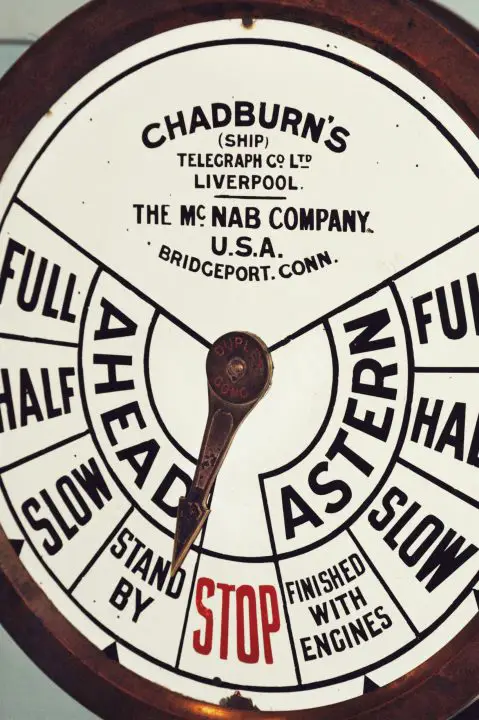
Types of Boat Engine and Lifespans
There are a lot of factors that go into deciding if you’re getting a good deal on a boat or if it’s worth buying. But if you are looking at the hours, how many hours is a lot on a boat? The answer depends on the type of motor installed more than anything else.
Different types of marine engines have completely different lifespans.
Lifespan of Gasoline Boat Engines – Inboard and Outboard Hours
In general, marine gasoline engines have a life expectancy somewhere around 1,500 hours. These engines lead tough lives. They are generally operated near their upper RPM limits, unlike automobile engines.
Occasionally, you will hear a commercial operator who gets higher hours-2,000 or 3,000 out of their gasoline outboards. Unfortunately, this is the exception rather than the rule, and it doesn’t translate into the pleasure boat realm. On the water all day, every day, commercial operators will put those hours on their engines quickly while the engine is new. That is entirely different than expecting a 20 or 30-year-old motor to live through that much use.
So what is considered a lot of hours on an outboard motor? Most manufacturers and dealers say that the average outboard engine lasts about 1,500 hours on the typical private vessel before it needs a major overhaul or replacement.
That means there’s not much difference in the lifespan when comparing inboard vs outboard gas motors. All of these engines operate within similar parameters.
Lifespan of Diesel Boat Engines
On the other hand, the average marine diesel engine lasts much longer. Most would be expected to get 8,000 hours of service before it needed to be replaced. These engines are ideally suited for boat life, and they excel at operating at high RPMs for long periods. Workboats often see their diesel engines exceed the 10,000-hour mark.
But, just like with gas motors, getting to that many hours doesn’t come by accident. Most private owners wind up replacing their diesel well before these big hours are ever achieved for various reasons. Generally, though, low-hour engines have to be replaced due to neglect—not being run enough, and not being appropriately maintained.
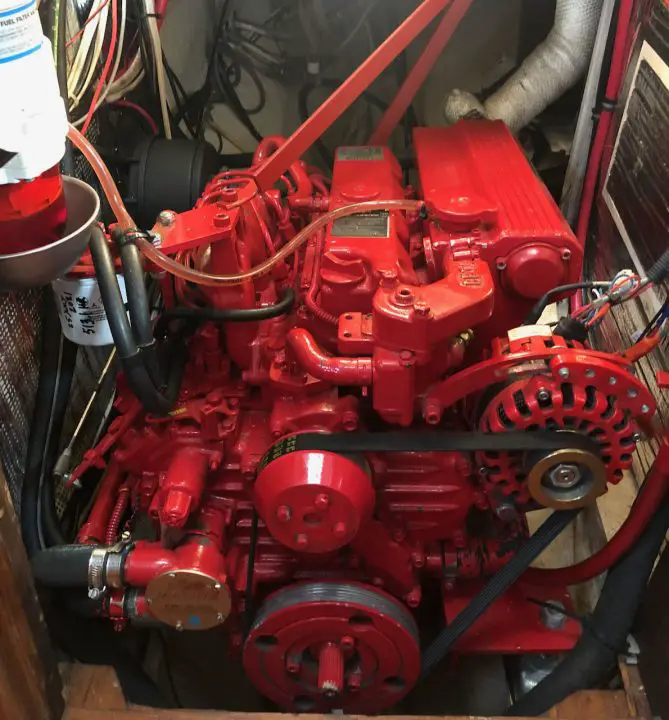
How to Check Boat Engine Hours
Boats are usually, although not always, equipped with an hour meter that operates when the engine is switched on. That’s the only source of information about how many hours you have operated a boat.
An hour meter is a simple device. If it is electrically attached to the wiring harness, it might count hours even when the engine hasn’t been started. This could skew its readings considerably. The best installations only count time when the engine is running.
Most newer motors have digital hour meters built into the engine tachometer. This is the most accurate counter and the hardest to mess with.
But used boat buying will teach you the importance of the legal Latin phrase “caveat emptor” faster than any other activity. Buyer beware.
Modern cars have moved away from analog odometers for a reason—they’re pretty easy to fiddle with. Digital ones are a lot harder. Plus, odometer checks are part of most states’ official records on a vehicle–not so with boats.
So if you want to know how to check boat engine hours, the most important thing is that you treat all numbers with suspicion. For example, if you’re going by the number on the tachometer, is it the original tachometer that came with the engine? Is there any reason or indication that it might have been replaced with a new tachometer, which would start the clock again at 0.0 hours?
If the boat has a stand-along hour meter, when was it added? Was it added when the motor was new, or were there a few hundred (or a few thousand) hours on it before adding that instrument? Even if the seller tells you there were x-number of hours on the boat before that point, how do they know that?
In the end, there is no sure-fire way to tell how many hours a boat has. All you can do is collect data based on the age of the boat, how you think they used it, what the hour meter says now, and how much confidence you have in the truth of these things.

Beyond Hours – Other Factors to Consider
So, if boat hours aren’t the best indication of a great deal on a used boat, what is? Here’s a look at some better indicators to compare used vessels of any kind.
General Condition and Care
A loved and well-cared-for boat shows its colors the moment you step onboard. If you are unfamiliar with boats, understand that it is tough to judge condition and care without setting foot on the vessel. But once aboard, it’s very easy to see, smell, and even hear.
When looking at liveaboard cruising boats, there are many ways to tell how well the boat is maintained. You don’t have to start by researching engine hours or maintenance histories—all you have to do is open your eyes. Does the boat look to be in good condition? When you go below, are there any funky smells? When you shine a flashlight into the bilge, is it clean or a disgusting, oily, stinky mess?
Boat shopping is an educational experience for new boaters. Unfortunately, a sad majority of boats out there are neglected. Some of them have prices that reflect it, and others do not.
These initial sensory cues should not put you off, especially if you’re looking for a deal on a used boat that needs a little work. But if you are looking for a cast off the lines and set sail sort of used boat, don’t settle until you’ve found a boat that is in the condition you want.
Regular Use
It’s still possible for a boat to look, smell, and sound good but be in a state of disuse. A wise seller will spend time staging the vessel to show buyers, so hopefully, they’ll do things like get rid of any smells or clean the bilge.
So ask the owner or the broker how much they used the boat, where they kept it, and what trips it has gone on recently. Be extra wary if it is in a boatyard—boats often come and sit in boatyards for years at a time. Usually, the engines aren’t even started while they’re there.
Maintenance
Like any other piece of equipment, a boat needs to be maintained. Many self-sufficient owners do their own work, while others trust their marina or boatyard to do it for them.
Regardless, there should be some service history and some receipts available to prove what work gets done. When was the last oil change? Have any repairs been needed? Owners are usually quick to point out any new parts they’ve had to install. Just remember, they didn’t just replace that heat exchanger out of boredom—it might have been corroded by seawater and rust due to neglect.
Type of Engine and Boat
Finally, as mentioned above, different engines age differently. Some makes and models of engines are better than others. Some engines require frequent maintenance, and others require very little.
You’ve got to analyze the boat based on realistic expectations for the type of boat you’re looking for. For example, if you’re shopping for 30-year-old sailboats, a 30-year-old diesel engine with 4,000 hours and a complete maintenance history should be just fine. But what if there’s also a 20-year-old sailboat on your list, and it has 1,000 hours on the motor? That might be more tempting, but only if there’s also proof of regular maintenance and servicing. So are higher engine hours always bad? Definitely not.
The example above illustrates just how complicated the question of engine hours is. When comparing boats, engine hours are one of the least important factors to consider compared to other factors.
Pre Purchase Inspection
Any deal on a new boat–but particularly on used boats–should be subject to a survey and sea trial. This is a critical part of the buying process where you get to hire your own professional to perform mechanical inspections. The goal is to find any major problems that could be a deal breaker.
But the survey is also your chance to go through all the systems, service records, and engine compartments–to find out if it’s the low hour boat of your dreams or too many hours on too neglected a boat.
Repowering Boats
The next logical step you might take when looking at old boats is the idea of repowering. The idea of repowering is always tempting—you can get a good deal on an older but solid hull and put the extra money into a brand new motor.
Unfortunately, the math seldom adds up to make this endeavor worthwhile. Motors of any kind are costly, as is the labor to install them. In addition, some boats are tough to repower and custom work by experienced technicians to mount a new engine in the old spot.
Outboard boats are the easiest to repower, but again, motors are expensive. By the time you’ve found a solid hull, purchased a new engine, and had it installed, you’ve usually spent way more money than had you found a boat with engines in good shape to begin with.
On the used boat market, there is no sweeter find than a boat that has been repowered by another. Unfortunately, you will not usually get your money back after a repower for the reasons outlined above. Boat prices are set by the age and condition of the hull–and not much else. A newer engine will elevate the price slightly but not enough to offset the total cost of the repower.
So, How Many Hours on a Boat is A Lot?
As you can see, the answer is quite complicated. Boats are complex pieces of machinery. Plus, don’t forget that they inhabit one of the most hostile environments on the planet—the moving ocean. So the number of hours is just one of many factors you need to consider when looking at different boats.
Boat Hours FAQs
Is 400 hours on a boat a lot of hours?
A boat with around 400-500 hours is in the prime of its life—it has low hours and is therefore probably a good value on the used market. A boat with this number of hours is not considered high time, but it’s also not brand new. The bugs have been worked out. Gasoline-powered engines last about 1,500 hours, while diesel engines can last as much as 8,000 hours. However, all life estimates depend on the type of use and the frequency of maintenance.
Is 700 hours alot for a boat?
It depends on the type of boat, what sort of motor it has, its age, and how hard it was used. Boats generally do not do well when neglected, so if the boat is often used, then 700 hours is not very much. For a gasoline engine, 700 hours is about mid-way through its lifespan. On the other hand, a diesel engine with 700 hours could still be considered like-new and is probably only about 10 percent of the way into its life.
Is 1000 hours on an outboard a lot?
The typical lifespan of an outboard is around 1,500 hours. So one with 1,000 hours is at roughly 2/3 of its life expectancy and would be considered a high hour boat. Of course, many factors dictate how long a motor will last. Of course, an outboard could last much longer with regular use and good maintenance. But without these things, it could also potentially be in bad shape at 1,000.
